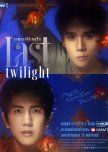Let’s talk about Mhok
As this series highlights on Day’s life, I hope this review gives some insight on Mhok’s characters and my brief thoughts on episode 12 (spoiler-free).
From what I gathered throughout the episodes, the Last Twilight is not only the story of a blind man (Day) who feared of society’s perception because he was once a beloved national athlete.
This is also the story of an orphan (Mhok) who struggled to integrate back into the society because he was once a convict with unresolved trauma.
I would like to commend on Mhok for his love, support, commitment and devotion in Day's day-to-day life. He rebuilds Day’s confidence (like a mechanic) and helping Day to face the outside world, once again as a blind man.
Since the series begins with Mhok’s flawed and woeful past, I feel this series should ends with Mhok redeems himself by forgiving himself over his past.
Mhok is a person who tries his best for others despite being too tough on himself. He is a person with tough exterior but also with insecurities which mainly kept to himself - e.g: how society treated him as a convict, trauma over the lost of family member, power imbalance and social status between him and Day, the feeling of inferiority with his capability to provide and care for Day.
Mhok’s issues should be explored on later episodes, however this can only happen - if and only if Day reciprocates by trying to understand where Mhok’s insecurities stem from.
Maybe an extra episode to explore this will be suffice?
In my opinion, this series should ends with a relatable yet heartfelt lesson of how these two unfortunate characters heal their relationship. And also for Mhok to absolve himself over his past, giving himself the closure he needed the most.
[note of reference: Moonlight Chicken (2023) explored the complexity of different characters overcoming the loss of loved ones and going through phases of denial, grief, healing and acceptance - e.g.: ideally the relationship of Alan and Wen, Jim and Beam, Gaipa and his mom/ Jim].
About the second half of episode 12, perhaps the screenwriter and director were hoping to dedicate this part to a specific audience - e.g.: the blind community.
This might be why episode 12 has a fairytale-like ending, where there might be a chance in life that the intended audience could once see again.
Nonetheless the cinematography, soundtrack and locations chosen for this series are equally pleasing and beautiful.
From what I gathered throughout the episodes, the Last Twilight is not only the story of a blind man (Day) who feared of society’s perception because he was once a beloved national athlete.
This is also the story of an orphan (Mhok) who struggled to integrate back into the society because he was once a convict with unresolved trauma.
I would like to commend on Mhok for his love, support, commitment and devotion in Day's day-to-day life. He rebuilds Day’s confidence (like a mechanic) and helping Day to face the outside world, once again as a blind man.
Since the series begins with Mhok’s flawed and woeful past, I feel this series should ends with Mhok redeems himself by forgiving himself over his past.
Mhok is a person who tries his best for others despite being too tough on himself. He is a person with tough exterior but also with insecurities which mainly kept to himself - e.g: how society treated him as a convict, trauma over the lost of family member, power imbalance and social status between him and Day, the feeling of inferiority with his capability to provide and care for Day.
Mhok’s issues should be explored on later episodes, however this can only happen - if and only if Day reciprocates by trying to understand where Mhok’s insecurities stem from.
Maybe an extra episode to explore this will be suffice?
In my opinion, this series should ends with a relatable yet heartfelt lesson of how these two unfortunate characters heal their relationship. And also for Mhok to absolve himself over his past, giving himself the closure he needed the most.
[note of reference: Moonlight Chicken (2023) explored the complexity of different characters overcoming the loss of loved ones and going through phases of denial, grief, healing and acceptance - e.g.: ideally the relationship of Alan and Wen, Jim and Beam, Gaipa and his mom/ Jim].
About the second half of episode 12, perhaps the screenwriter and director were hoping to dedicate this part to a specific audience - e.g.: the blind community.
This might be why episode 12 has a fairytale-like ending, where there might be a chance in life that the intended audience could once see again.
Nonetheless the cinematography, soundtrack and locations chosen for this series are equally pleasing and beautiful.
Cet avis était-il utile?





